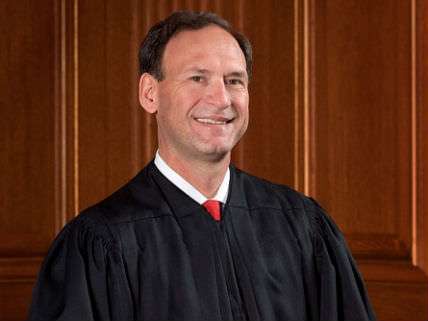Today at SCOTUS: Public-Sector Unions, Mandatory Unions Fees, and the First Amendment
Can the government compel non-members to pay mandatory union fees?
In 1977 the U.S. Supreme Court ruled that state governments may force public-school teachers to pay mandatory union fees, as a condition of employment, regardless of whether or not those teachers are union members. Known as an "agency shop arrangement," this scheme was justified by the Court in Abood v. Detroit Board of Education on the grounds that the government has a lawful interest in preventing non-members from "free riding" on the union's collective-bargaining efforts. That decision, which provided a significant boon to public-sector unions around the country, has been in place ever since.
Today the Supreme Court will hear oral arguments in a case that asks whether Abood should be overruled. Friedrichs v. California Teachers Association centers on a Golden State public-school teacher named Rebecca Friedrichs who refuses to join the teachers union and objects, on First Amendment grounds, to the fact that she is forced to provide financial support to the very union whose agenda she has explicitly disavowed. "Just as the government cannot compel political speech or association generally," Friedrichs and her lawyers told the Supreme Court, "it cannot mandate political speech or association as a condition of employment."
In its 1977 Abood ruling, the Court grappled with the idea that "compel[ling] employees financially to support their collective-bargaining representative has an impact upon their First Amendment interests." But in the end the Court decided that this "impact" did not rise to the level of a genuine First Amendment infringement when it came to public-sector collective bargaining.

In recent years, however, the Court has signaled a more critical attitude towards Abood and its impact on the First Amendment. In 2012's Knox v. Service Employees International Union, Local 1000, for example, the Court invalidated the SEIU's "indefensible" imposition of a one-time special fee without giving non-members advance notice and the opportunity to object (as is standard practice in agency shop arrangements). As Justice Samuel Alito held for the Court, "procedures for collecting fees from nonmembers must be carefully tailored to minimize impingement on First Amendment rights, and the procedure used in this case cannot possibly be considered to have met that standard."
Two years later, in Harris v. Quinn, the Court went further, refusing to allow the state of Illinois to treat at-home personal health care assistants as government workers subject to Abood's agency-shop fee requirements. "Because of Abood's questionable foundations, and because the personal assistants are quite different from full-fledged public employees, we refuse to extend Abood to the new situation now before us," Justice Alito again wrote for the Court.
Needless to say, Justice Alito's reference to "Abood's questionable foundations" did not sit well with supporters of public-sector unionism. In her Harris dissent, for example, Justice Elena Kagan faulted Alito for "taking potshots at Abood." She also faulted the petitioners in that case for asking the Court to consider "overruling Abood and thus imposing a right-to-work regime for all government employees."
Which brings us back to the present litigation. In oral arguments today in Friedrichs v. California Teachers Association, the Supreme Court will hear a case that places Abood itself squarely on the chopping block. Was Justice Kagan right to worry about "right-to-work"? We'll soon find out.


Show Comments (43)